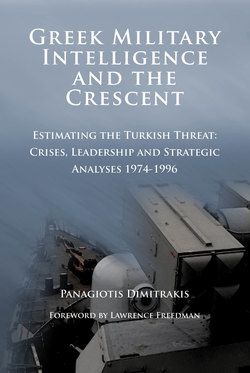Greek Military Intelligence and the Crescent

Реклама. ООО «ЛитРес», ИНН: 7719571260.
Оглавление
Dr. Panagiotis Dimitrakis. Greek Military Intelligence and the Crescent
Отрывок из книги
I owe special thanks to Professor Sir Lawrence Freedman and Dr Joseph Maiolo, of the Department of War Studies, King’s College London, my PhD supervisors for their advice and support. I would like to thank all of my interviewees who provided me with a rare insight into the Greek-Turkish relations and intelligence estimating. Without their personal interest and patience this research would have never been completed. Special thanks go to Olympia Wood, John Wood and Peter Barnes for their help in copy-editing. My publisher Paul Honeywill of the University of Plymouth Press deserves special credit for bringing into life this book.
Finally, I owe a great debt to my family, Yiannis Dimitrakis, Dimitra-Mimi Petropoulou-Dimitrakis and Timos Dimitrakis, for their moral and material support, for the insightful foreign-policy and history-oriented conversations we have, and for believing all these years in my work. This book is dedicated to them.
.....
Perceived change in the external environment. Threat to basic (or non-basic) interests. High awareness of the eventuality of resorting to the use of force. The realization that the decision-makers have a finite/limited time framework to establish and implement a strategy for response.33
Williams refers to two main approaches in the discipline of crisis management. The first approach claims that crises occur in the international system like some sort of a ‘disease’ that no inter-state relations could avoid. The main task of crisis management is the avoidance of war and the formulation of diplomatic options to resolve the dispute in a mutually acceptable fashion. In contrast, the zero-sum approach regards crisis management as an opportunity for the advancement of national interests. Confrontation, coercion and the communication of any threats are integral parts of good crisis management and the main aim of skilful leadership is to get the opponent to back down.34 The zero-sum approach promotes a ‘zero-sum mentality’. The intentions, capabilities and behaviour of the opponent are always interpreted as hostile. This approach induces an increased sensitivity to threats, both real and imagined and may lead to counter-action and a further escalation of the crisis. In contrast, the understanding that crises are inevitable ‘diseases’ promotes a framework of interpretation or mindset which decreases threat sensitivity. The actions and decisions of the opponent are interpreted as initiatives primarily directed toward avoiding armed conflict and it is assumed that both sides share a mutual interest in the avoidance of war. Both approaches shape the analysis of intelligence during a crisis.
.....